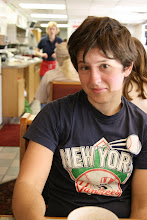 I'm reading Roland Barthes' Camera Lucida, a short text in which he dissolves and resolves the photograph. It's amazing and easy to read and is helping me consider new strategies for projects I'm interested in trying. I read the first 15 chapters today-- here are some good parts:
I'm reading Roland Barthes' Camera Lucida, a short text in which he dissolves and resolves the photograph. It's amazing and easy to read and is helping me consider new strategies for projects I'm interested in trying. I read the first 15 chapters today-- here are some good parts:"... strangely, the only thing that I tolerate, that I like, that is familiar to me, when I am photographed, is the sound of the camera. For me, the Photographer's organ is not his eye (which terrifies me) but his finger: what is linked to the trigger of the lens, to the metallic shifting of the plates."
"Of brief duration; I have no need to question my feelings in order to list the various reasons to be interested in a photograph; one can either desire the object, the landscape, the body it represents; or love or have loved the being it permits us to recognize; or to be astonished by what one sees; or else to admire or dispute the photographer's performance, etc.; but these interests are slight, heterogeneous; a certain photograph can satisfy one of them and interest me slightly; and if another photograph interests me powerfully, I should like to know what there is in it that sets me off. So it seemed that the best word to designate (temporarily) the attraction certain photographs extend upon me was advenience or even adventure. This picture advenes, that one doesn't....The photograph itself is in no way animated (I do not believe in "lifelike" photographs), but it animates me: this is what creates every adventure."
I was especially interested in Barthes' dissection, later on, of the attraction between individuals and certain photographs into two co-dependent elements: the studium and the punctum. He attributes studium "to a kind of general enthusiastic commitment, but without speical acuity," while he calls the other element punctum, a word also connotating "a sting, speck, cut, little hole-- and also a cast of the dice." Barthes caontinues, "A photograph's punctum is that accident which pricks me (but also bruises me, is poignant to me)." I think about this a lot-- how the volume of the interaction between an image and the person looking at it is erratic and often unpredictable-- how some pictures really seem to ignite a fire while other's remain inert. It's the same with any kind of image, song, or choice. The picture I am posting for today is not my own, just one of many classical black and white calendar-type nature shots. This one though, I'm almost embarrased to report, simultaneously massaged my studium and hit me in the punctum.

No comments:
Post a Comment